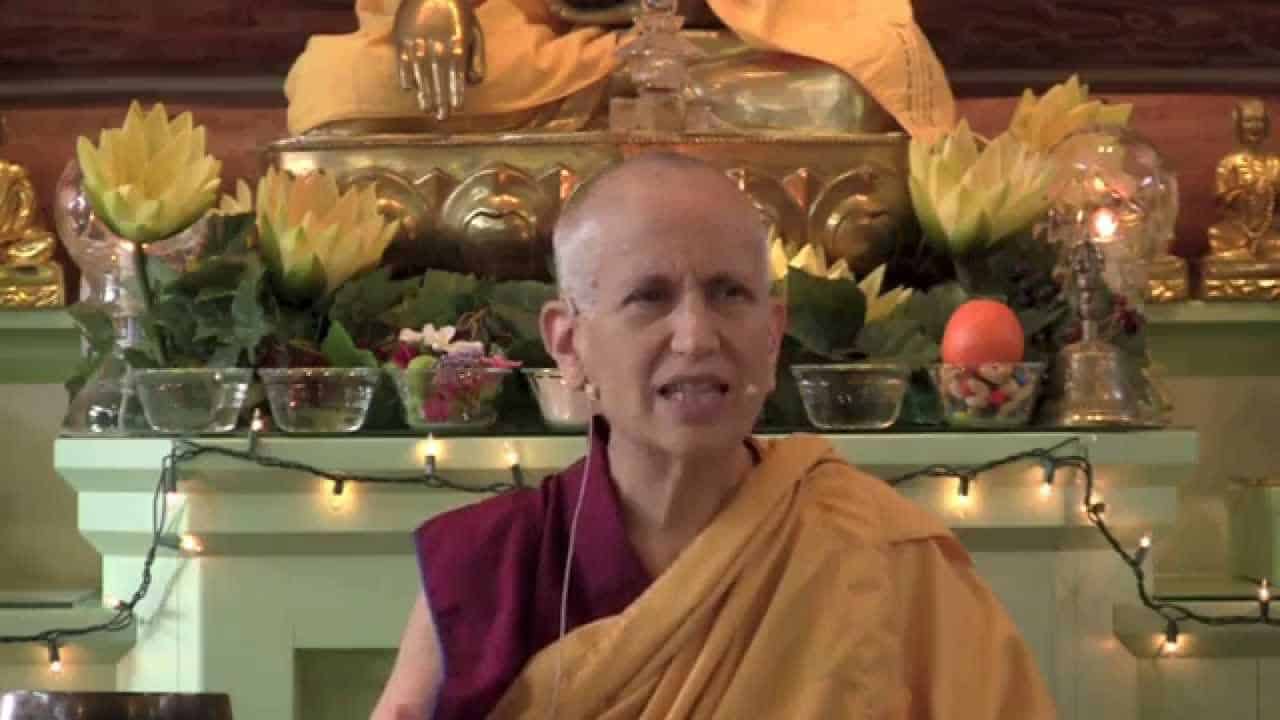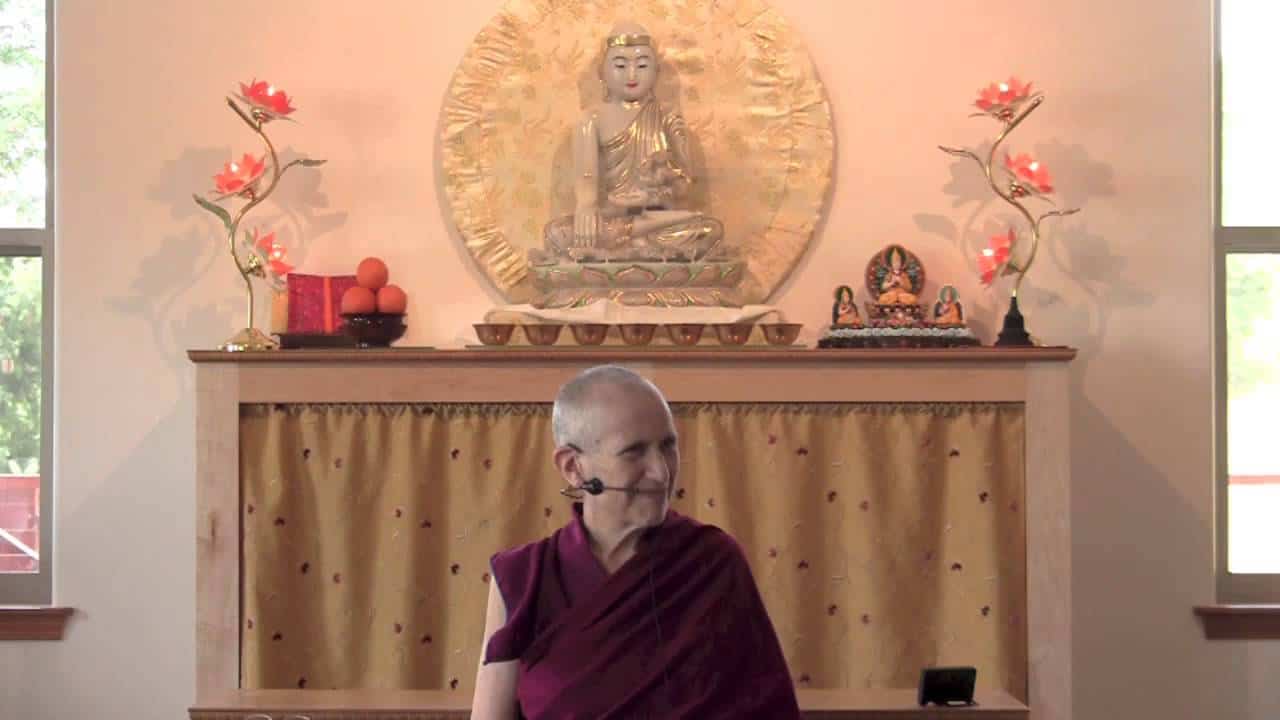The pathways of physical nonvirtue
Part of a series of teachings on the text The Essence of a Human Life: Words of Advice for Lay Practitioners by Je Rinpoche (Lama Tsongkhapa).
- The ten nonvirtuous paths of action
- The three physical nonvirtues in depth
- Killing
- Stealing
- Unkind, unwise sexual behavior
The Essence of a Human Life: The pathways of physical nonvirtue (download)
“From bad will come the long and unbearable pain
of the three lower realms;
from good the higher, happier realms
from which to swiftly enter the echelons of awakening.”
Know this and think upon it day after day.
We started on that verse before. It’s about karma and its results. Last time I explained the different kinds of results—the three (or another way to explain it is four) results.
Today I thought I would go through the actions, the 10 nonvirtues to avoid. Since this is a text explicitly for lay people, then it’s good to go through these to make sure that everybody knows them. Monastics had better know them by now. Lay people there’s an excuse—maybe you haven’t learned them yet. I would say we haven’t learned them, but we’ve sure done them.
There are three that we do physically, with our body; four we do verbally, involving communication; and then three we do mentally, with our mind. These actually are called not 10 “karmas” but 10 pathways of karma (or 10 pathways of action) because these 10 are paths that can lead to rebirths. Only the first seven are actions, and the last three are afflictions (when you get technical about it). And you’ll see why as I describe them.
Killing
As we go into the first three physical ones, we have killing, which is intentionally taking somebody’s life. Worst is to take a human being’s life. Accidentally stepping on an ant that you didn’t see doesn’t count because all these actions have to be intentional. So it’s deliberately killing humans, animals, insects. It doesn’t include plants. People always ask “why not?” And that’s because according to a Buddhist viewpoint, plant are biologically alive but they aren’t sentient life in the sense that they don’t have consciousness so they don’t experience pain and pleasure. Then people say, “But what about the auras and people who sing to their plants and they grow….” I don’t know. Maybe it’s just effects of different vibrations and so on, I really can’t answer that one. Then people ask, “Well how small does it have to be?” Definitely insects are included, they have sentient life. Now when you get to viruses and bacteria, it’s really hard to know. Generally they say—especially viruses—are not sentient life. Bacteria…. You really need to ask somebody who has clairvoyant powers, who can tell where there’s consciousness and where there isn’t. But generally speaking, not so much.
Incorporated into the killing precepts, even though it’s not a full break of it, is harming others’ bodies: injuring people, beating them, stabbing them, shooting them, anything that causes physical injury to somebody. It wouldn’t be a full act of killing, but it certainly is something that’s negative.
Stealing
The second one is stealing. The literal translation is “taking what is not freely given,” which in some ways I think it’s better to use that because that gives us a much broader feeling. When we hear “steal” we think of somebody who breaks into the house in the middle of the night. But we don’t necessarily think of extortion, cooking the books, things that go on on Wall Street that are “legal” but done with the intention to really take what hasn’t been freely given. Or some things that are illegal. So legal or illegal doesn’t matter. If the mind is trying to take something that has not been freely given to us, that is what we call stealing.
It could also be you work at a company and you use the company’s resources for your own private life when the company hasn’t given you permission to do that. You go on all sorts of meals on the company card but it’s actually with your family, not with business associates. I always wonder a little bit about these “business associate” meals, you know? Using the company car for private purposes, these kinds of things. Not paying taxes that we’re supposed to pay. Not paying fees that we’re supposed to pay. Sneaking into something through the back door when you’re supposed to be paying. Or when the limit for the children’s fair is 12, you tell your 16-year-old to look small and say they’re 12. Things like this. That kind of thing is lying and stealing.
Stealing can also be done [when] we borrow something and then we don’t return it and we consider it ours thereafter. Just forgetting to return it but not considering it ours yet isn’t the full act. But when we just forget about it—we borrow money, we borrow a book. I can’t tell you how many books our Abbey library has lost because people started reading them here and [the books] found their way into their luggage. Even though they have a tag that says “Sravasti Abbey” the person doesn’t think to mail them back. Then that becomes stealing.
Unkind or unwise sexual behavior
Then the third physical one is usually called “sexual misconduct.” I prefer to translate it as unkind or unwise sexual behavior. The usual explanation of it is adultery (is the most serious thing). You’re in a relationship, you go with somebody outside. It doesn’t matter whether you’re married or not. If you’re in a relationship, you go outside of that. And you may be single but if you go with somebody who’s in a relationship.
Vasubandhu gives all sorts of other things that I think may be not so helpful for people nowadays. I think the sexual precept—unkind and unwise sexual behavior—depends a lot on culture. In ancient India you could go to a prostitute. That wasn’t considered sexual misconduct, unless somebody else paid for her but you used her. Then that was a breach. But just going to the prostitute, fine. Nowadays there are some different feelings about that, because prostitution (especially), it’s the women who get arrested, but it’s the men who support it and make it happen. So the pimps, the johns, and so on. So I think you have to look at exploitation, sexual trafficking, and all those kinds of issues now when you think of unwise and unkind sexual behavior.
I think you also have to think about the possibility of sexually transmitted diseases, and if you’re having unprotected sex when you know that you have something, or there’s a chance that your partner does but you don’t use protection. I consider that unwise sexual behavior. In ancient times they didn’t think that much about this. They didn’t have these kinds of things. But now I think it’s quite important.
There’s no stipulation about sex before marriage. That’s not an issue. But I think nowadays just using people for our own sexual pleasure without thinking that they have feelings and they may be getting attached, I would consider that unkind sexual behavior. Lots of times, you know how it is in relationships: “Oh yes, we have an open relationship, no problem. Nobody’s going to get jealous, there’s no problem. You go with who you want, I’ll go with what I want. We’re a free, open relationship.” Until you do it. And then people’s feelings get hurt, there are breaks of trust, there are all sorts of things like that, And the same, even if two people are single, if they’re just using each other, one of them could be actually getting attached to the other. The other one considers “oh yes, free, open, no attachment.” But meanwhile one of them’s getting attached. So that kind of attitude, not really thinking of the other person as a human being, but just objectifying them and using them for your own pleasure. To me something doesn’t seem very correct in that.
So I am not giving you the standard definition, except for the adultery one. I think if I gave you Vasubandhu’s then you’d be more upset. I think the one that I give you is something, if you think about, may actually make some sense and may help you make wise choices.
Tomorrow we’ll go on to the four verbal ones.
Questions and answers
Audience: I was thinking about that when you included in the first one about killing about harming others, the thought that came up was about people who do martial arts and sports, because sometimes in sports there is the idea that we want to hurt the other person. But it’s kind of like, it’s a competition, you want to win, I was just thinking about the karmic thing of sports and martial arts.
Venerable Thubten Chodron (VTC): Well, if you’re doing martial arts, just for exercise, it’s different than having the intention to hurt somebody. I think some people just do it for exercise, or they may do it for defensive things. But if you have the motivation to hurt it’s something else.
Same thing with sports. If you compete, okay. But if you go into the game and [think], “I’m going to try and injure somebody so that they can’t play,” that’s not good. That’s not virtuous.
And sometimes that happens. Supposedly referees will catch it and they’ll kick the people out of the thing, but who knows what really goes on.
Audience: There was a question yesterday in the Q&A that I always forget how to logically respond to it, but she said, well, they say not to kill even the animals, but what about all the insects that vegetarians kill when they’re harvesting the plants.
VTC: Yes, that’s true. But they aren’t being killed intentionally unless you’re spraying. I mean, if you’re spraying you’re intentionally killing.
Audience: The cultural revolution in Tibet when very senior lamas were shot. What’s the consequence if you kill someone who’s a very holy being?
VTC: Yes, the karma of killing a holy beings, like happened during the Cultural Revolution, both in Tibet and in China. I was explaining before how holy beings and the Three Jewels are stronger objects with which we create karma, so the result of killing them is going to be much stronger than killing other beings. When you think of the karma that these soldiers created in the Cultural Revolution, and also the populace, too, it wasn’t just the soldiers. It’s horrible, dreadful karma. So just because your government tells you to do it doesn’t necessarily mean it’s good to do. We have to use our wisdom, too.
Now somebody’s going to ask me “Well, what about Kim Davis? The government’s telling her to do something and she isn’t doing it. Are you talking about her, too?” No. She needs to do her job. [laughter]
Venerable Thubten Chodron
Venerable Chodron emphasizes the practical application of Buddha’s teachings in our daily lives and is especially skilled at explaining them in ways easily understood and practiced by Westerners. She is well known for her warm, humorous, and lucid teachings. She was ordained as a Buddhist nun in 1977 by Kyabje Ling Rinpoche in Dharamsala, India, and in 1986 she received bhikshuni (full) ordination in Taiwan. Read her full bio.


